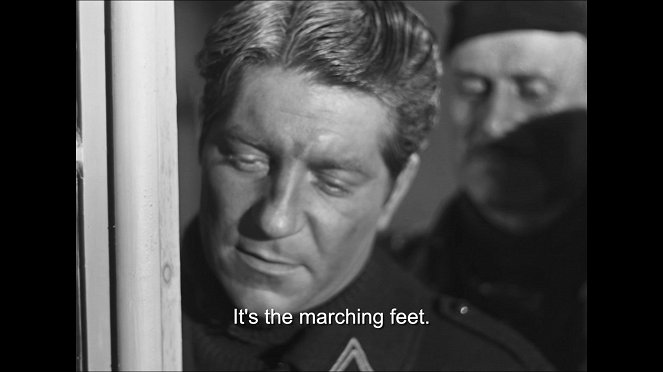Regie:
Jean RenoirKamera:
Christian MatrasMusik:
Joseph KosmaBesetzung:
Jean Gabin, Dita Parlo, Pierre Fresnay, Erich von Stroheim, Gaston Modot, Marcel Dalio, Jacques Becker, Jean Dasté, Julien Carette, Claude Vernier (mehr)Streaming (1)
Inhalte(1)
Zwei französische Soldaten, der adelige Captain De Boeldieu und Lieutenant Marechal, geraten im Ersten Weltkrieg in Kriegsgefangenschaft. Zusammen mit einem anderen Gefangenen namens Rosenthal planen sie zu fliehen, doch sie werden noch vor ihrem Fluchtversuch getrennt und an verschiedenen Orten untergebracht. Wenige Monate später seben sie sich wieder, und zwar in einer Festung, die von dem ebenfalls adeligen van Rauffenstein kommandiert wird. Obwohl die Gefangenen hier sehr gut behandelt werden, sind die Fluchtpläne immer noch aktuell. (Verleiher-Text)
(mehr)Videos (1)
Kritiken (6)
Die Große Illusion wurde von einer ganzen Generation geliebt, die den Ersten Weltkrieg als authentisches Erlebnis in Erinnerung hatte. Marlene Dietrich verliebte sich sogar in Jean Gabin, und nach seinem Weggang nach Hollywood wurden sie ein Liebespaar. Aber ich hätte nie gedacht, dass die einfachen Szenen aus dem Landleben mit Dita Parlo am absolut wirkungsvollsten sein würden.
()
A powerful thought, especially at the time it was made. But for my taste it is served up too superficially and some scenes are laughably blatant (now something for the really dumb ones, or remember the ruminations while feeding the cow). Which I wouldn’t mind so much, if only it had been as much fun as at the beginning. But this isn’t as light-hearted as Stalag 17 so it would work as a comedy, but at the same time this lacks any drama. There’s no suspense, no fear for the characters, simply nothing. They all just spout didactic wisdom about the importance of understanding each other, regardless of language, nation, race, club membership and god knows what else. In view of the fact that despite the timelessness of the central thought, this is still an escape movie, that’s risky. Way too risky.
()
I applaud the laudable idea of mutual respect and understanding between two nations at war, but its treatment left me suspiciously cold. The film is tuned to a single emotional wave that doesn’t leave a significant mark on the audience, and for a narrative not based on twists or unpredictability, it doesn't feature any memorable characters, although Gabin, Fresnay or directorial legend Stroheim will certainly win undeniable sympathy. But the biggest problem I see is that many of its motifs have been recycled and refined so many times over the years, mostly by Hollywood, that today it’s difficult to appreciate the true meaning of Grand Illusion and not see the stylistic form of the film as outdated. That said, the fact that this is an important and inspiring work is evident in almost every frame. 70%
()
I gotta say that the movie is incredible considering the era it’s from. While the Czech Republic was in the middle of Vlasta Burian’s golden years, France was filming a resistance war movie that referred to the WWI, not knowing that in two years, the no less terrible WWII would come to be. Not only was The Grand Illusion incredibly ahead of its time, but the French also filmed it in an astonishing way. You might not get much war as such because Stanley Kubrick only came up with mass war movie scenes for Paths of Glory, but you’ll get feelings and impressions of people who took part in the war. The only reason I’m not rating it with five stars is because the 114 minutes dragged on. However, that was nothing in comparison to the movie’s value. It’s not often that something is so ahead of its time. There’s no better way to say this – hats off to the authors, but also to the actors who agreed to film this at such arestless time.
()
It's been about two years since a cycle of French films from the 1930s was broadcast on TV, celebrated classics that every film critic and art critic raved about. They seemed affected by time and to me, it's just film history that mostly passes me by. This film is a different story. I would say it is timeless and emotionally it managed to bring me exactly what Renoir intended. He had no intention of making an adventurous film about escape. This is a political film, where through the model of a few prisoners and their antagonist in the form of a typical Prussian aristocrat with elitist thoughts, he wanted to demonstrate and support the idea of republicanism, equality, and resistance against war, as well as resistance against the rapidly spreading antisemitism at the time. It is not a coincidence that he chose for his protagonists a plebeian officer played by Jean Gabin, a Jewish soldier, moreover, a wealthy one, who directly responded to theories about a Jewish elite pulling the strings, and a selfless officer from higher social circles who understands that the era of blue blood has long passed. Considering the time of its creation, it is truly a high-quality film, where the acting performances serve the social message. Overall impression: 90%.
()
Galerie (71)
Photo © R.A.C. (Réalisation d'art cinématographique)



Werbung